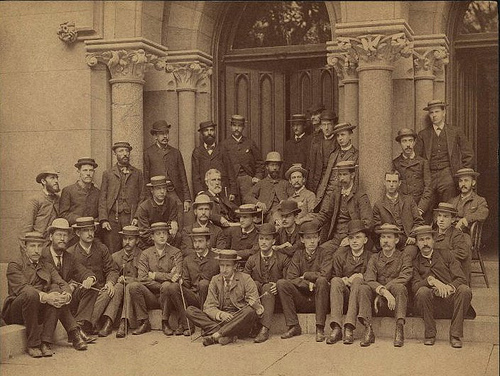My father was the biggest Yankee fan I knew but he never wanted me to be Mickey Mantle. He wanted me to be Mickey Mantle’s lawyer. He grew up poor in the Bronx and always viewed the Law from the perspective of an urchin in a Dickens novel. The Law was grand, exalted, and highly remunerative. Saying one’s son was a lawyer not only sounded both refined and prosperous, to a Depression era kid it represented the Platonic ideal of order in a chaotic world. And I bought it. Of my high school and college friends, six became lawyers. My friend of longest standing — we met in first grade — was an outlier. Desperate to be Ernest Hemingway, he went to Europe, he drank wine, he wrote a novel (currently in a drawer). And then he went to law school. Today, he’s a trusts and estates lawyer. For the first twenty-one years of my life that was the future: suit, tie, oxford cloth shirt, polished hard-soled shoes, court appearances, filing of briefs, whispered conferences in judges’ chambers, and, oh, that reliable paycheck.
In the late 1970s, for liberal arts majors with only a vague notion what to do with a BA, law school was the fixed point in a spinning world. There was enough flexibility in the field to perform good works, make a decent living, or perhaps do both at once (pro bono!). If you earned good grades and couldn’t conjure a viable alternative, law school was the default setting back then. As a college senior faced with having absolutely no idea how to earn the money required to pay the bills that alarmingly accrued with adulthood, I dutifully signed up for the law boards. And in the middle of the test there came a revelation: I might have no idea what to do with my life but whatever I wind up doing it won’t be this.
Several months after graduating from college, while home brooding one day — the intervening summer had failed to instill me with a sense of purpose — my mother delicately suggested I take the Johnson-O’Connor Test. This is an aptitude test designed to give confused young people some idea where they might fit into the larger economic picture. The one thing I specifically recall from my Johnson-O’Connor experience was being tested for manual dexterity by having to pick up randomly dropped pins from a flat surface and to neatly align them. The haplessness with which this task was performed led the Johnson-O’Connor staff to inform me that I was not cut out to be a dentist. Here’s what else I learned: Nothing. I can’t recall a single job for which the administrators thought I had an aptitude (shame may have clouded my memory), although I do remember that every one of them represented a lifetime of drudgery and regret.
As a kid, I wrote stories, poems, and plays, and not all of it was awful. I also played football, basketball, and baseball. In my head I was a guard on the Knicks, the Giants’ fullback, and the first baseman of the Yankees. In my head I was not a writer. That I was not a particularly talented athlete didn’t matter, fields and courts were where my dreams lay. The modest literary promise I showed didn’t register. Like being kind to animals, to me it seemed more of a quality than a skill.
Around the time of the Johnson-O’Connor test, the New York Daily News needed a copyboy and because the job didn’t involve picking up pins and neatly aligning them on a flat surface, I was hired. My skills at getting coffee were mediocre but I clocked the newsroom denizens furiously typing, paid to do something I’d always done for free. The comedy club boom was starting to happen so I wrote an article about it on spec and sold it to a national magazine. My fate was sealed.
In New York there is a trusts and estates lawyer named Jeremy Best. He gave up a promising literary career to become an attorney and now writes poetry in his free time. Jeremy Best is the Bizarro World version of me, which makes sense since he is one of the main characters in my new novel, and his eternal state of regret is what I imagine would have been mine had I pursued my father’s life plan for me instead of my own. There is a reason the book is called I Regret Everything.
Why did I almost become an attorney? Fear that nothing else I had the skills for would allow me to make a decent living? The need for parental approval? The desire to be perceived as something other than what I was? To review: Fear, Neediness, Fakery. These are all terrible reasons to choose a career, but excellent material for creating a deeply flawed character. And these bad qualities have the added benefit of being bad qualities I intrinsically understand. They are my raw material and can be drawn on the way a method actor draws on experience from his life to create an emotional reality for the character he’s playing.
Our fantasy lives are a goldmine. We are senators, surgeons, stage directors, stand up comedians, veterinarians, master criminals, entrepreneurs, physicists, scholars, architects, racecar drivers, archaeologists, diplomats, recording artists, sheriffs, shepherds and shamans. But those are only fantasies. The thing we could have really been, the life we might have actually inhabited? That is a ghostly reality and this life that never happened is, in its own mysterious way, nearly as real as the one that did.
Seth Greenland is a writer and co-host of The LARB Radio Hour. His latest novel, I Regret Everything, was reviewed here.


